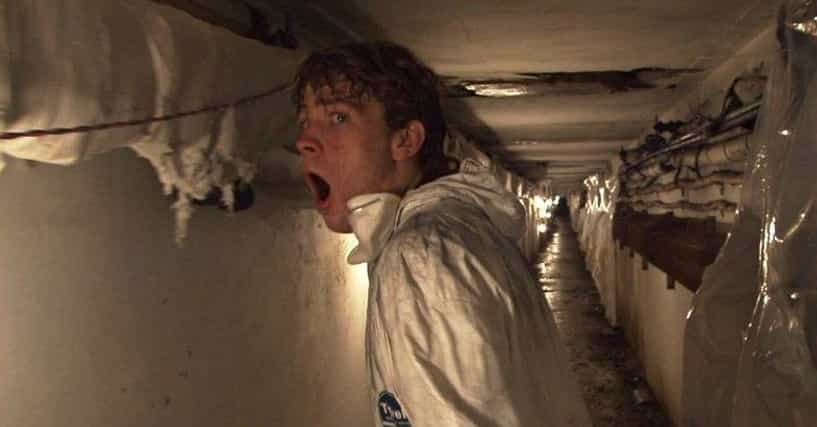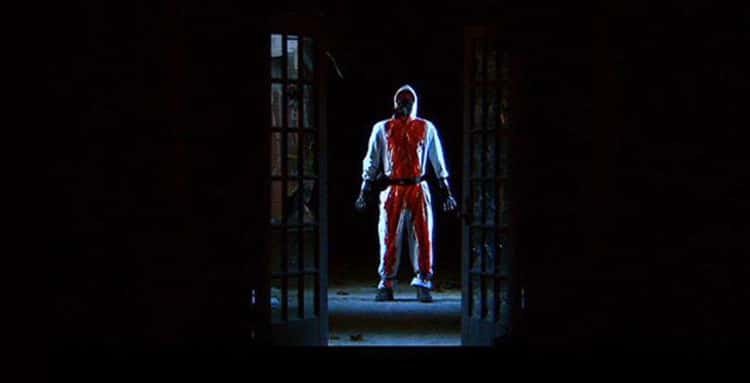I remember sitting in a rather empty theater in 2001, waiting to see Session 9. My ex was an Insulator, and that drove us to the cinema that night to see this underrated horror gem. This ambiguous film has perhaps never found the audience it should have. After 20 years, I feel it deserves a reexamination.
A film about five asbestos workers that crack under pressure, working around a tight deadline, and the many life problems that follow them, Session 9 is riveting. One of the workers finds the psychotherapy session tapes of patient Mary Hobbs, and this minimalistic, low-key film evolves into its own, slow, methodical descent into madness.
There was not much of a release for this film, but from word of mouth it grew a well-deserved cult following over the years.
Uta Briesewitz does an amazing job with the cinematography, as this is the first film to be shot with 24p HD digital video, and shot mostly in the daytime. This movie has a grungy, documentary feel. There are great slow zoom dolly shots, and some creative creepy camera moves with incredible lighting. One of the movie’s great strengths is its location, the real Danvers Mental Institution. Danvers becomes another character in this film, giving an overwhelming presence of entropy and decay. The nerve-jangling piano score by the Climax Golden Twins adds to the atmospheric feel.
One thing that has been debated is whether this movie is either a rip-off or an homage to The Shining. It has the title cards, a wife named Wendy, and the awesome, inspiring presence of the Danvers Mental Hospital, totally on par with the Overlook Hotel. Any space like that affects the people within… Session 9 clearly had an idea to be noted in any discussion of Stanley Kubrick's classic film. Whether you believe it is a rip-off or an homage, I will leave that up to you… The setting does its job. In Danvers, you will be afraid. The beautiful atmospheric shots in and around this historic building, a character in itself, ad to the sense of oppressive dread in this film.
The acting is top rate. Director Brad Anderson, who co-wrote with actor Stephen Gevedon (Mike) takes the time to develop well-drawn, distinctive characters. David Caruso, hot off his CSI gig, is great as pragmatic Phil. Peter Mullen does a career-best as overwhelmed, desperate Gordon, struggling under the stress of a newborn baby and a failing business. Josh Lucas (Hank) is the resident asshole of the crew, and newcomer to the crew Brendan Sexton III (Jeff) is totally out of his element as he negotiates the personalities around him. There is some tense acting between these characters, as family, money, and the stress of this job in this creepy setting get the best of them. You feel like you are hanging out with real people in a real place, something difficult to achieve.
By day seven we are asking, who is really going insane in this movie? There are red herrings, almost a little too predictable, but it will still definitely leave you questioning. Is this a psychological thriller, or a supernatural movie? There is no wrong answer. It's a little of both.
SPOILER
When you get to the drastic conclusion, did Gordon just snap under life's pressure or did the spirit of Simon, let loose in the session tapes, possess him? There is great tension here, leading to the violent climax. Desperation prevails, right in line with today's financial crisis. There is horror in real life, how we treat the mentally ill, and the possibility of losing your livelihood. Did that lead to a mental breakdown, violence, and murder, or is Simon, one of Mary Hobbs repressed personalities, taking over here to lead the chaos?
If you are someone who likes horror with excessive gore and pop scares, this is not the movie for you. This movie is quiet but gets under your skin, not in your face. Men tend to mask their emotions, but all is laid bare here. While it has never had the traction to become a modern classic, Session 9 has an awful, tactile subtext that elevates it to a film that is predictive of our modern elevated horror today.
Patricia Pirillo




